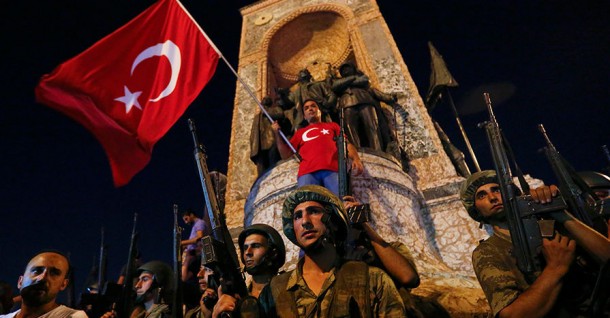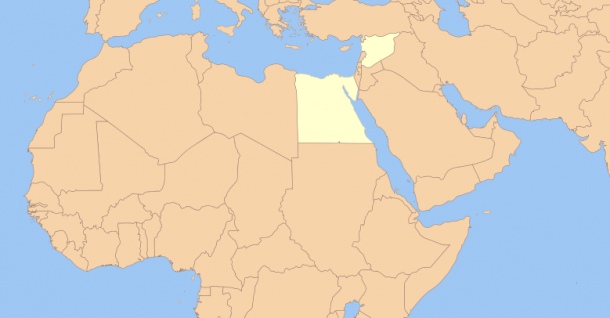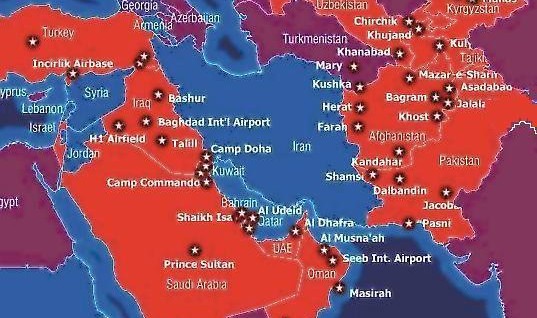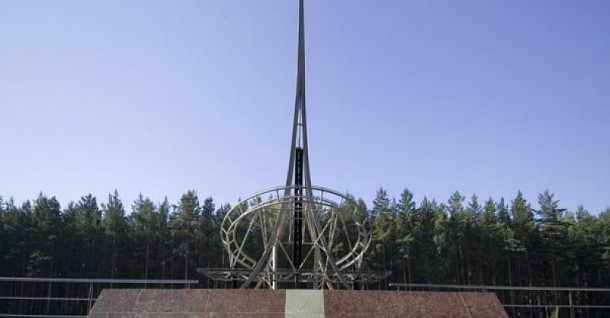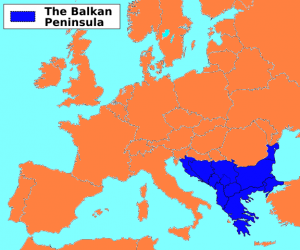 The Ukrainian crisis lasting these months has revealed lability of actual state of affairs in the whole world and has brought to notice to other fundamental cracks. There are not a few potential niduses of various kinds of instabilities on the modern world political map. The Balkan Peninsula is one of them for sure. Lying on a junction of Europe, Asia and Africa the Balkans is of interest of the biggest world geopolitical actors.
The Ukrainian crisis lasting these months has revealed lability of actual state of affairs in the whole world and has brought to notice to other fundamental cracks. There are not a few potential niduses of various kinds of instabilities on the modern world political map. The Balkan Peninsula is one of them for sure. Lying on a junction of Europe, Asia and Africa the Balkans is of interest of the biggest world geopolitical actors.
***
It’s obvious that powers, participating in energy supplying, were not able to leave this region out in the cold. Here uncertainty of the scenario in Ukraine, the main transit country of Russian gas to Europe, actualizing the question of alternative routes as never did before. Apparently, one who controls energy supplying chains is able to significantly affect not only conjecture in the mainland, but beyond as well.
One of the alternative routes of gas supplying from Russia to Europe is the South Stream pipeline project which allows Russia to become a monopolist on European market of blue fuel. The pipeline should cross the bottom of the Black Sea approaching Bulgarian port Varnu, and then due to the plan it divides going from Varnu to Italia and Austria.
The South Stream project was developed by Russia and some of the other European countries (first of all by Germany) after Russia–Ukraine gas disputes in 2006 which resulted outages of supplying the gas to Europe. After that EU had decided to diversify the routes of Russian gas in circumvention of instable Ukraine. Despite launching under the Baltic Sea the North Stream pipeline in 2011 this was found insufficient to satisfy European growing demands in fuel. In turn through the South Stream pipeline Russia is ready to supply to Europe additional 63 billion cubic meters per year. The participation agreement had been signed by Bulgaria, Serbia, Hungary, Slovenia, Croatia and Austria. By this agreement transit countries will be acting as the importers at the same time, and this will provide them with about 300 million dollars annual revenues.
***
Of course this would be too ingenuous to believe that the West will stand apart of this processes and won’t make attempts to undermine Russian monopoly. A fortiori there is the Nabucco pipeline project as a main alternative having being conducting since 2002 and aiming at connecting EU better to the natural gas sources in the Central Asia. The capacity of the Nabucco pipeline had been estimated in 20-30 billion cubic metres per year, and the rout laid from Azerbaijan to Georgia, Turkey, Bulgaria, Hungary, Romania and Austria.
But firstly, it emerged that there weren’t real sources to fill pipes (the reason is that Russia began to buy up Azerbaijanian natural gas at higher price, and Turkmenistan started focuses on China and Iran more; and the last refused to participate in project for political reasons). Secondly, Russian authorities mastered in Balkans by enlisting as partners Bulgaria and Serbia through granting concessional loans. Thirdly, instable situation in Turkish Kurdistan had an impact, and the alternative project through Armenia dissatisfied the main potential supplier – Azerbaijan.
After the Nabucco project had failed, USA and EU alternative plan was to construct gas pipeline from Qatar through Saudi Arabia, Syria and forward underneath the Mediterranean Sea. However the Lavrov-Kerry Geneva agreement concluded because of disability of Washington to set up the Washington sponsored regime in Damask had destroyed these plans as well.
It’s very important for USA to sabotage the Russian Southern Stream pipeline because they wish to keep the strategic dominance in Europe. If the Southern Stream is constructed EU will be more dependent from Russian gas and USA automatically will lose the part of strategic influence in the region. It is clear for Europeans too, that’s why they don’t pose risks to construction of pipeline yet. The fact is that they really need to increase the gas supply to cover their current demands in energy for further development of European economy. Andrew Monaghan, NATO safety expert who is difficult to be suspected in pro-Russian sympathies, considers “we can’t just go away from Russia without knowing where to go”.
On the other hand, the fact that the independent policy of Russia in energetic field for sure is not a thing that Brussels likes so much. But only in case if the interests of all 28 states –members of EU are identified with corporate interests of Brussels bureaucracy. For G?nther Oettinger, Jose Manuel Barroso and other high officials who preparing for elections to European Parliament it’s a need to play anti-Russian card for their own political survival in the structure of Euro-Atlantic community.
***
The attempts to set up the influence in Balkans were taken by the West late at the end of last century. And when in 1990th on Yugoslavia ruins six new countries were formed and after bloody battles the peace agreements were signed consequently the protectorate system of different level of subordination was fixed. Nevertheless Brussels failed in attaining the objective social and economic progress neither in Bosnia nor Macedonia, Albania and Kosovo in particular.
The more demonstrative in this rank is exactly Bosnia model. The situation in industrial sector and in economy became worse in Bosnia after Association Agreement was signed in 2008. Domestic goods couldn’t compete with their analogues from EU. Finally the enterprises were forced to decrease expenses by reducing the stuff, however this was temporary measure. By 2012 the industry of Bosnia and Herzegovina was practically inactive; the enterprises couldn’t pay taxes to provide the payment of pension and social benefits.
Social injustice in Bosnia caused the riots in February 2014. In fact unemployment level in the country reached 44% according to the records of National Statistical Agency (in the estimation of the World Bank this rate was only 27,5%). Since the moment of signing Dayton peaceful agreement the country exists at the funds of the international community, including funds from SEED (Support for East European Democracy) program. It’s worth to mention that one of the organizations standing for protestors bears the name Stroke, and in the light of Ukrainian events it poses to interesting parallels.
At the moment domestic crisis in Bosnia and Herzegovina being in disability of leaders to negotiate the formation of central executive and judicial agencies is deepened. And this when in Europe they seriously think about the concept of Muslim influence restriction. By the way the Muslim influence plays an important role in Balkans. It may happen that some religious groups including those of radical orientation made contribution to organization of February protests.
The activity of radical groups in the territory of Bosnia and Herzegovina was intensified by 2011 when radical organization activists arrived to the country. Moreover the part of activists doesn’t hide their views and uses the expressions popular in radical circles like “takfeer” i.e. practice of excommunication. Some leaders of radicals succeeded in launching of mass campaign among local Muslims.
And gradually these groups came to the foreground in this region amongst all Muslim religious movements. It’s obvious that it will post the new bloody ethnic and religious military conflicts. These conflicts may cover more territories than during the war in Bosnia. The matter is that influence of radical groups involves the neighboring countries: Montenegro, Macedonia, and Serbia. There are Muslim communities in every state residing tightly like in Sandjak located in Serbia, Montenegro and Bosnia. If the military conflicts start the aftereffects will be horrible for peaceful people. Those tragedies happened during Bosnia war would fade against the horrors of new ethno religious clash.
However the radicals won’t be able to get the upper hand on their own. Therefore the crucial role will play those who render them some certain support. It’s a notable fact that many radical activists acting in Balkans now, traveled across Europe easily before they reached their destination. And some radicals are known for their relations with “takfeerist” organizations, and European security agencies know them by sight.
The remarkable fact is that during February protests in Bosnia the disorders involved those places exactly where the activity of radical groups was vigorous. Though the Muslim factor isn’t considered as the main in the germ of conflict in Bosnia and Herzegovina but at the same time it may become the catalyst of further protest moods. The fact is that this situation is quite convenient for those who wish to jeopardize “the Southern Stream” project realization. Thus the social tension in Balkans is advantageous for the certain forces in the East, and Muslims actually are used “in ignorance”, because most of them unfortunately don’t realize the geopolitical processes in the world.
***
There is no doubt that USA will only lose if the Southern Stream project is implemented. In Washington they realize that completion of the gas pipeline will weaken Washington status as the main geopolitical player in Balkans. For that reason they try to delay the realization of this project. In Brussels the White House and its satellites mobilized the forces against Southern Stream even in those countries who are the main beneficiaries of this project. Serbia plays the main part in it.
Modern Serbia doesn’t have an independent foreign policy and blindly follows the instructions from outside. The government is under tough control of Washington, Berlin and Brussels. In addition, Serbian progressive party had won the last parliament elections; the leaders of this party lobby the integration with European Unity. However everything may change dramatically when Southern Stream will supply gas in pipes. It’s obvious that incomings and investments will pull out Serbia from debt slavery and dependence from EU as well as from the International Monetary Fund and the World Bank.
By opinion of ex-chairman of Economic Council of Democratic Party of Serbia “the issue is the integrated oil and gas agreement that will bring 2 milliards of Euro investments and 200 million Euros of annual transit payments to Serbia. Besides the third largest in South-Eastern Europe gas storage will be constructed with Russian money”.
For Moscow the signing of all necessary agreements with Balkan states including Serbia is a success of geopolitical meaning because the influence of Russia in South-Eastern Europe will be increasing. Involvement of Serbia will take away the main competitor – Nabuссo pipeline. The new competitor — Trans Adriatic Pipelinу (TAP) — can’t be considered a decent contestant to Southern Stream; TAP should deliver Azerbaijan gas through Turkey, Greece and Albania to the south of Italy and the transit prices in Greece and Italy are much higher. Besides the success of Russian project puts in doubt the perspective of shale gas development in Europe, which is the strong competitor to natural gas as they say lately.
***
These all show that Balkan Peninsula is one of the key points on the political world map. This was the place where the First World War started. Nowadays the outcome of “energetic wars” in the region depends on Balkans. The fact that in some Balkans countries the big resources of crude oil were found shouldn’t be ignored either. In 2011 the well-known oil and gas company Shell signed “the Agreement on oil and gas deposits research” with Bosnia authorities. And it’s not accidental, according to some reports oil reserves in Bosnia and Herzegovina may be compared with the same in Saudi Arabia. There is the information that significant oil reserves were discovered at the seashore of Croatia and Montenegro.
It’s impossible to ignore the combination of economic factors concentrated in Balkans and round it in the modern geopolitics. And the majority of political processes in the modern world are closely connected with those “economic battles” that touch this strategically important region anyhow. Those who win this confrontation will gain one of the valuable “geopolitical prizes” of modern times – economic welfare of all European civilization.
Ilmutdin Gasanov, Muslim Politic-portal analyst
![Электронный журнал [Электронный журнал]](/magazine.static/magazine-front.jpg)
